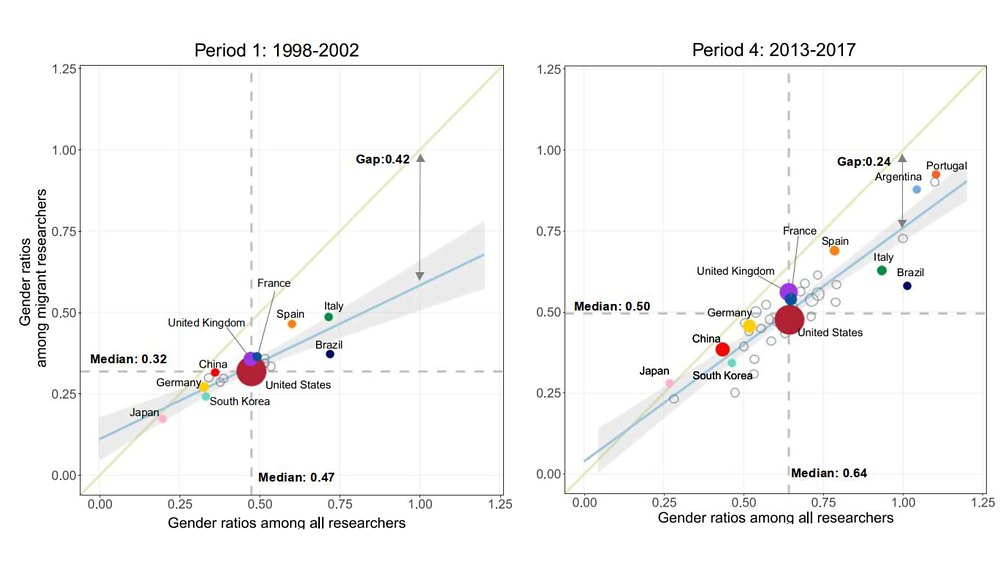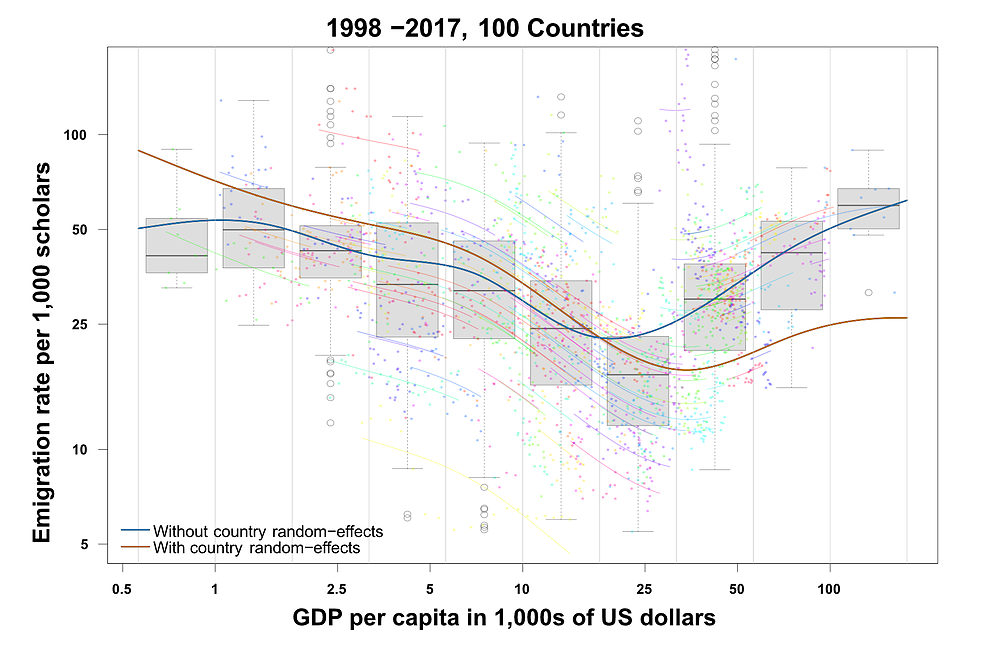Laboratory
Migration and Mobility
At a Glance
Projects
Publications
Team
Project
Migration and Mobility of Scholars
Aliakbar Akbaritabar, Asli Ebru Sanlitürk, Xinyi Zhao, Tom Theile, Emilio Zagheni, Maciej Danko, László Németh; in Collaboration with Samin Aref (University of Toronto, Canada), Jevin West (University of Washington, Seattle, USA), Andrea Miranda-González (University of California, Berkeley, USA), Alexander Subbotin (Lomonosov Moscow State University, Russian Federation), Francesco Billari (Bocconi University, Milan, Italy), Guy Stecklov (The University of British Columbia, Vancouver, Canada)
Digital trace data give us unprecedented opportunities for understanding patterns of mobility among scholars, testing existing migration theories, and developing new ones. This project leverages large-scale bibliometric data to measure and model the migration of scholars on a global scale. Detailed Description
Gender ratios among all researchers and migrant researchers

Gender ratios among all published researchers (X-axis) and migrant researchers (Y-axis). The size of each country’s circle is proportional to the number of female researchers who migrated from and to that country. The 45-degree line in green shows equality across the two dimensions, and the blue line shows a fitted regression. © MPIDR
Source: Based on the paper by Zhao, Xinyi; Akbaritabar, Aliakbar; Kashyap, Ridhi and Zagheni, Emilio, A gender perspective on the global migration of scholars, Proceedings of the National Academy of Sciences, https://doi.org/10.1073/pnas.2214664120, 2023
The relationship between emigration rates of scholars and economic development

Scholarly emigration rates (1998 to 2017) as a function of GDP per capita (2017 constant international dollars at purchasing power parity (12)). The combined data for each year and country are plotted as a box plot, while the country- and year-specific data are plotted using colored dots. Each color represents a separate country. With an increase in GDP per capita, the migration propensity of scholars first decreases. At higher income levels, it increases. © MPIDR
Source: Based on the paper by Sanliturk, E., Zagheni, E., Dańko, M. J., Theile, T., & Akbaritabar, A., Global patterns of migration of scholars with economic development. Proceedings of the National Academy of Sciences, 120(4), e2217937120. https://doi.org/10.1073/pnas.2217937120, 2023
Education and Science, Internal Migration, Housing, Urbanisation, International Migration, Ethnic Minorities, Migration, Statistics and Mathematics
Mexico, Russian Federation, United Kingdom, World
Publications
Akbaritabar, A.; Dańko, M. J.; Zhao, X.; Zagheni, E.:
Proceedings of the National Academy of Sciences of the United States of America 122:15, e2424521122–e2424521122. (2025)

Ghorbanpour, F.; Zordan Malaguth, T.; Akbaritabar, A.:
In: Proceedings of the Nineteenth International AAAI Conference on Web and Social Media (ICWSM): Copenhagen, Denmark, June 23–26, 2025, 636–652. Washington, DC: AAAI Press. (2025)

Akbaritabar, A.; Haunschild, R.; Bornmann, L.:
In: Proceedings of the 28th International Conference on Science, Technology and Innovation Indicators (STI2024), Berlin, Germany, 18-20 September 2024, 1–10. Zenodo. (2024)

Akbaritabar, A.; Theile, T.; Zagheni, E.:
Scientific Data 11:816, 1–14. (2024)

Walk, E.; Akbaritabar, A.:
SocArXiv papers. unpublished. (2024)

Akbaritabar, A.; Dańko, M. J.; Zhao, X.; Zagheni, E.:
MPIDR Working Paper WP-2023-038. (2023)

Akbaritabar, A.; Theile, T.; Zagheni, E.:
MPIDR Working Paper WP-2023-018. (2023)

Şanlitürk, A. E.; Zagheni, E.; Dańko, M. J.; Theile, T.; Akbaritabar, A.:
Proceedings of the National Academy of Sciences of the United States of America 120:4, e2217937120–e2217937120. (2023)

Zhao, X.; Akbaritabar, A.; Kashyap, R.; Zagheni, E.:
Proceedings of the National Academy of Sciences of the United States of America 120:10, e2214664120–e2214664120. (2023)

Şanlitürk, A. E.; Aref, S.; Zagheni, E.; Billari, F. C.:
MPIDR Working Paper WP-2022-019. (2022)

Zhao, X.; Aref, S.; Zagheni, E.; Stecklov, G.:
Scientometrics 127:12, 7707–7729. (2022)

Zhao, X.; Aref, S.; Zagheni, E.; Stecklov, G.:
In: 18th International Conference on Scientometrics and Informetrics ISSI 2021: 12-15 July 2021, KU Leuven, Belgium; proceedings, 1369–1380. Leuven: ISSI. (2021)

Zhao, X.; Aref, S.; Zagheni, E.; Stecklov, G.:
Abstracts of the International Cartographic Association 3:327, 1–2. (2021)

Miranda-González, A.; Aref, S.; Theile, T.; Zagheni, E.:
EPJ Data Science 9. (2020)

Subbotin, A.; Aref, S.:
MPIDR Working Paper WP-2020-025. (2020)

Abel, G. J.; Muttarak, R.; Bordone, V.; Zagheni, E.:
European Journal of Population 35:3, 543–562. (2019)
Alburez-Gutierrez, D.; Aref, S.; Gil-Clavel, B. S.; Grow, A.; Negraia, D. V.; Zagheni, E.:
In: Smart statistics for smart applications : book of short papers SIS2019, 23–30. Pearson. (2019)

Aref, S.; Zagheni, E.; West, J.:
In: Social Informatics 11th International Conference, SocInfo 2019, Doha, Qatar, November 18–21, 2019, Proceedings, 50–65. Cham: Springer. (2019)